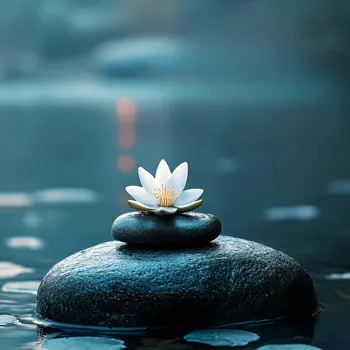Discover the transformative power of mindfulness. Learn 6 techniques to boost well-being. Start your journey now
In today's fast-paced Bharat, where deadlines loom larger than life and WhatsApp notifications
ping incessantly, finding a moment of peace can feel like searching for a needle in a haystack.

We're constantly bombarded with information, demands, and expectations, leaving us feeling stressed, overwhelmed, and disconnected from ourselves. But what if there was a simple yet powerful tool that could help us navigate this chaos and cultivate a sense of inner calm?
Enter mindfulness – the practice of paying attention to the present moment without judgment.
It's not about emptying your mind or escaping your problems; it's about learning to observe your thoughts and feelings with curiosity and acceptance, allowing you to respond to life's challenges with greater awareness and resilience.
This ancient practice, rooted in Buddhist tradition, is now recognised by experts as a proven method for improving mental and emotional well-being.
Mindfulness is not some esoteric concept reserved for monks meditating in the Himalayas.
It's a practical skill that anyone can learn and integrate into their daily life, no matter how busy or stressful it may seem. The rewards are immense.
Studies have shown that regular mindfulness practice can reduce stress, anxiety, and depression, improve focus and concentration, enhance emotional regulation, and even boost physical health.
By training our minds to stay present, we can break free from the grip of negative thoughts and emotions, cultivate a sense of gratitude and appreciation for the simple things in life, and ultimately, live more fulfilling and meaningful lives.
It is a journey of self-discovery, a gentle invitation to reconnect with ourselves and the world around us with kindness and compassion.
Here are 6 simple yet effective mindfulness techniques you can start practicing today to boost your well-being:
Mindful Breathing
This is perhaps the simplest and most accessible mindfulness technique. All you need is your breath. Find a comfortable position, close your eyes gently, and bring your attention to the sensation of your breath as it enters and leaves your body.

Notice the rise and fall of your abdomen or the air passing through your nostrils. When your mind wanders, as it inevitably will, gently redirect your attention back to your breath without judgment.
Even just a few minutes of mindful breathing each day can have a profound impact on your stress levels and overall well-being. Try timing yourself, starting with 2 minutes and increase to 5 minutes daily.
Body Scan Meditation
This technique involves systematically bringing awareness to different parts of your body, noticing any sensations without judgment. Lie down comfortably and begin by focusing on your toes. Notice any sensations, such as tingling, warmth, or pressure.
Gradually move your attention up your body, from your feet to your ankles, calves, thighs, abdomen, chest, arms, hands, neck, and head. If you encounter any discomfort or pain, simply acknowledge it and breathe gently into the area.
The body scan meditation can help you become more aware of your body's signals and release tension. This can really improve you well being and make you at peace.
Mindful Walking
Turn your daily walk into a mindful practice by paying attention to the sensations of your feet making contact with the ground. Notice the rhythm of your steps, the way your body moves, and the sights, sounds, and smells around you. Resist the urge to get lost in thought or distracted by your phone.

Simply be present with each step, allowing yourself to fully experience the present moment. You will be able to control your thoughts and practice mindfulness at one go! This can reduce stress and control your mood. Just make sure you are walking in a peaceful environment.
Mindful Eating
We often eat mindlessly, rushing through meals without really tasting or appreciating our food. Mindful eating involves slowing down and paying attention to the sensory experience of eating. Before you take a bite, observe the colors, textures, and aromas of your food.

As you chew, notice the flavors and the sensations in your mouth. Eat slowly and deliberately, savoring each bite. By practicing mindful eating, you can develop a healthier relationship with food and experience greater satisfaction from your meals. Start with one meal a day and then move to others.
Loving-Kindness Meditation
This practice involves cultivating feelings of love, compassion, and kindness towards yourself and others. Begin by focusing on yourself and repeating phrases such as "May I be happy," "May I be healthy," "May I be safe," and "May I be at ease.
" Then, extend these feelings of loving-kindness to your loved ones, friends, acquaintances, neutral people, and even those you find difficult. Loving-kindness meditation can help you develop greater empathy, compassion, and connection with others.
Its a very nice practice that will bring peace to others and to yourself. Remember do not overthink the process.
Mindful Listening
In our busy lives, we often fail to truly listen to others. Mindful listening involves paying attention to what someone is saying without interrupting or formulating your response. Focus on their words, tone of voice, and body language.
Be present with them and show genuine interest in what they have to say. Mindful listening can improve your relationships and create deeper connections with others. Its a great way to connect with people and spread love as well. Do try to connect with your audience.
Mindfulness is not a quick fix, but a lifelong journey. It requires patience, practice, and a willingness to be kind to yourself. There will be days when your mind feels particularly restless or when you struggle to stay present. That's okay. Simply acknowledge your struggles and gently redirect your attention back to the present moment. Be persistent, and do not lose hope. Remember, every moment is a new opportunity to practice mindfulness and cultivate greater well-being. In the long run, you will be a master of this habit.
Incorporating mindfulness into your daily routine is easier than you think. Start small, perhaps with just a few minutes of mindful breathing each morning or a mindful walk during your lunch break.

Gradually increase the amount of time you dedicate to mindfulness practice as you become more comfortable. You can also find numerous free resources online, such as guided meditations and mindfulness apps, to support your practice.
Give yourself the gift of mindfulness and discover the transformative power of being present.
AI Generated Content. Glance/InMobi shall have no liability for the content












